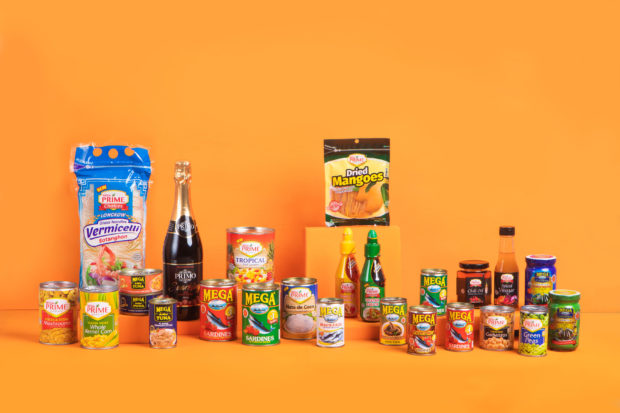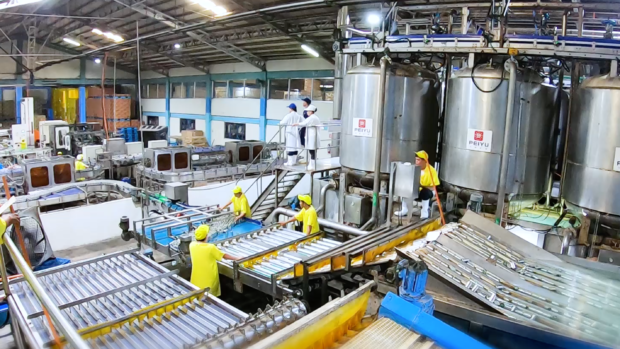Driven to excel by COVID-19
Written by Linda B. Bolido for INQUIRER.net
While most companies—from small home-based ventures to giant conglomerates—had to close or slow down last year because of the global coronavirus disease 2019 (COVID-19) pandemic, Mega Global Corp. actually doubled its production rate to meet increased consumer demand and to help those in need.
The challenges posed by the pandemic also strengthened the company’s resolve to push through with its plans for further expansion, tweaking the blueprints based on lessons learned from the devastating health crisis.

Being in the food business, Mega Global, maker of the Philippines’ top canned sardine brand, could not sit out the pandemic until things were back to normal. From operating below capacity during the enhanced community quarantine, it raised its daily production to the normal level of two million cans of sardines, as demand grew from consumers who had to quarantine at home and had to rely on less perishable canned goods or prepacked meals.
The output also went into the company’s care programs for front-liners, its employees and their families, and communities in need.
As founder and chief executive officer William Tiu Lim said, “Whenever there is a calamity or a national emergency, we go into overdrive, knowing that the cans of sardines we produce may be what would sustain our kababayan for days.”
Tiu Lim said the initiative was in keeping with the spirit of malasakit (concern or compassion), which had always been part of Mega Global’s corporate culture in more than four decades.
The company, which marked its 45th anniversary in 2020, set up the Mega Malasakit Kitchen, which provided hot meals to workers in services essential to communities—police officers manning checkpoints, barangay health workers and community volunteers, supermarket and grocery staff, bank employees and security guards, as well as street dwellers.
It spent millions to provide front-line health workers personal protective equipment and gave out care packages to its store merchandisers and distributors’ sales personnel.
Although the company pushed its production capabilities to respond to the health emergency, it was careful not to compromise its own workers’ health and safety. The company treats its employees as family, and is as concerned about their work performance, as much as their safety and well-being.
Its factories and warehouses adhered strictly to the health and safety protocols set by medical authorities to protect their workers and their families from the devastating disease. Work-from-home arrangements were allowed when possible.
Adaptability and flexibility
The challenges presented by the pandemic did not only provide Mega Global an opportunity to give back to those who had made it a Growth Champion, but also strengthened its resolve to pursue its expansion plans, already on the drawing board before COVID-19 struck.
The planned expansion will be the biggest in the company’s history, a response to the double-digit growth in domestic demand for its products even before the pandemic.
“The company is poised for further exponential growth. Demand has been outstripping supply for the past five years. We will continue to strive to be a solid quality food provider for the Filipino,” Tiu Lim said.
Some changes in the plans are to be expected because of the pandemic. The health crisis had been instructive, providing lessons that are valued and taken to heart, as the company looks ahead to celebrating its 50th anniversary.
“Our (original) plans, especially our marketing programs, are no longer applicable. We have to be able to act fast and make the necessary changes to adapt to the situation, help the community and address consumers’ needs,” Tiu Lim said. He would like their expansion plans to respond to future disruptions, like those caused by COVID-19, by being more flexible.
Expansion will, of course, mean growing the workforce. At the moment, Mega Global has 4,000 employees around the country. With its plans to set up a new manufacturing plant and add to its fleet of fishing vessels, the company will be creating new jobs, which will advance the goal of reviving the economy when the country finally manages to vanquish COVID-19.
Mega Global, which also exports its products, has the Philippines’ largest fishing fleet, allowing the company to sustain its 12-hour catching-to-canning process. Its fishing fleet and canning factories are in Zamboanga but it has distribution hubs in Luzon, Visayas and Mindanao.
Investing in technology
Aside from adding to its workforce, Mega Global will also continue to harness technology to streamline its operations and make production more cost-effective.
Mega Fishing Corp., which operates the company’s fishing vessels, already employs state-of- the-art fishing technology to find rich fishing grounds and make the trip from the sea to the canning factory as short as possible. Fishing vessels are equipped with sonar and fish finders. Fish pumps are used to shorten the period for loading the catch from one hour to just two minutes.
The company said use of the pump was an important innovation, as the shorter loading time ensured that the fish was fresher when it arrived in the canning factory. Contamination was also minimized as the fish was not handled by humans.
Marvin Tiu Lim, Mega Global chief growth and development officer, said, “We have always been proud of our fishing technologies and practices and have been continuously innovating, which has made it possible for Mega Global to bring convenience and high quality products that are healthier, tastier and affordable to Filipinos.”
The fresh sardine catch is brought to two canning factories—in Talisayan and Ayala, both in Zamboanga—that are fully automated, reducing the need for people to handle the products. The factory currently produces two million cans of sardines a day. Annual production is 300 to 400 million cans. No fishing is done between November and February to allow the sardine population to recover.
Malcolm Tiu Lim, who oversees the Zamboanga operations as chief technical and innovation officer, said the bulk of their production—about 80 percent—went to Luzon, primarily Metro Manila. He said the fast-paced life in the National Capital Region created a huge demand for the convenience of canned goods.
He said, with the growing demand for its products, Mega Global would continue to upgrade its facilities by investing in equipment that would make production faster and more efficient.
Complementing the use of new machinery is the upgrading of the knowledge and skills of workers, Malcolm said. Training programs are regularly conducted, especially during the closed fishing season when the canning plant suspends operations.
New manufacturing plant
A major part of the expansion and upgrade is the construction of its first manufacturing plant in Luzon. Mega Global chief operating officer Michelle Tiu Lim Chan said, “We are allocating at least P1 billion for the whole year (of 2020) and next year (2021).”
The amount would be used for the construction of the new Mega manufacturing plant in Batangas. The new plant will boost Mega Global’s efforts to raise its existing share of the sardine market by a double-digit figure in three to five years.
Chan said the Batangas manufacturing plant would boost the company’s capability to meet the growing demand for its products in Luzon and abroad and would help revitalize the Philippine economy after the pandemic.
The state-of-the-art, multi-line energy-efficient facility located in Santo Tomas is designed to increase the company’s production capacity by 20 percent when it becomes fully operational in 2022. It is expected to create some 1,000 new jobs.
Chan said, “This plant will also allow us to support local businesses as we plan to source our raw materials and manpower from suppliers within Luzon as part of DTI’s (Department of Trade and Industry) Buy Local, Go Lokal initiative.”
Even as the company expands and further modernizes its facilities, it has also grown its product offerings to include Mega Tuna, Mega Prime Quality, Mega Creations, Mega Mackerel and Primo Sparkling Juice, aside from its flagship Mega Sardines.
The diversification of its products and the buildup of its manufacturing capability will allow Mega Global not only to meet rising and changing consumer demands but also to put into motion quickly and efficiently its malasakit initiative the next time the country faces another major crisis like the COVID-19 pandemic.
ADVT
Read more Business stories:
Alagang Jollibee: Safety and extra care for customers served daily
Taking community building to heart
A love language like no other: Defeating diabetes amid the pandemic


